Key takeaways:
- Climate strikes are a powerful collective call for action against climate change, uniting diverse groups around shared concerns for the environment.
- Ocean conservation is critical for sustaining life on Earth, regulating climate, and supporting myriad marine ecosystems; small community efforts can lead to significant change.
- Personal experiences, such as witnessing environmental degradation, drive the urgency for climate action and inspire hope in future generations.
- Future advocacy should focus on sustained community engagement, merging grassroots efforts with policy change, and enhancing education about ocean importance to empower new advocates.
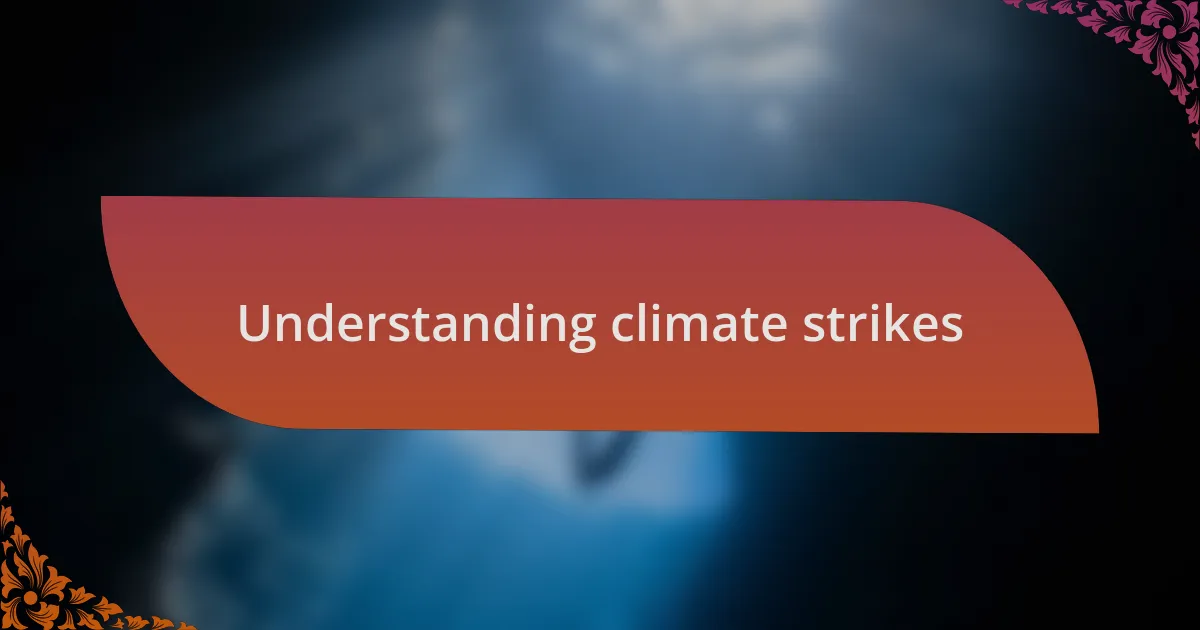
Understanding climate strikes
Climate strikes are more than just organized protests; they embody the urgent call for action against climate change. I vividly remember the atmosphere buzzing with passion as people gathered, united by a singular mission. It struck me how such diverse groups of individuals—students, families, and veterans—stood together, each carrying their own hopes and frustrations about the future.
As I stood in the crowd, I couldn’t help but wonder: what drives someone to leave their daily lives and join a climate strike? For many, this was a moment of awakening, a realization that their voice matters. I saw young children holding brightly colored signs next to elderly folks, reminding me that climate impact knows no age limits.
The emotional energy was palpable; it was a collective cry for justice, not just for us, but for future generations. I found myself reflecting on my own connection to the ocean and its delicate ecosystems. Hearing stories from others about their favorite beaches and marine life made me recognize that protecting our planet is deeply personal for everyone involved.
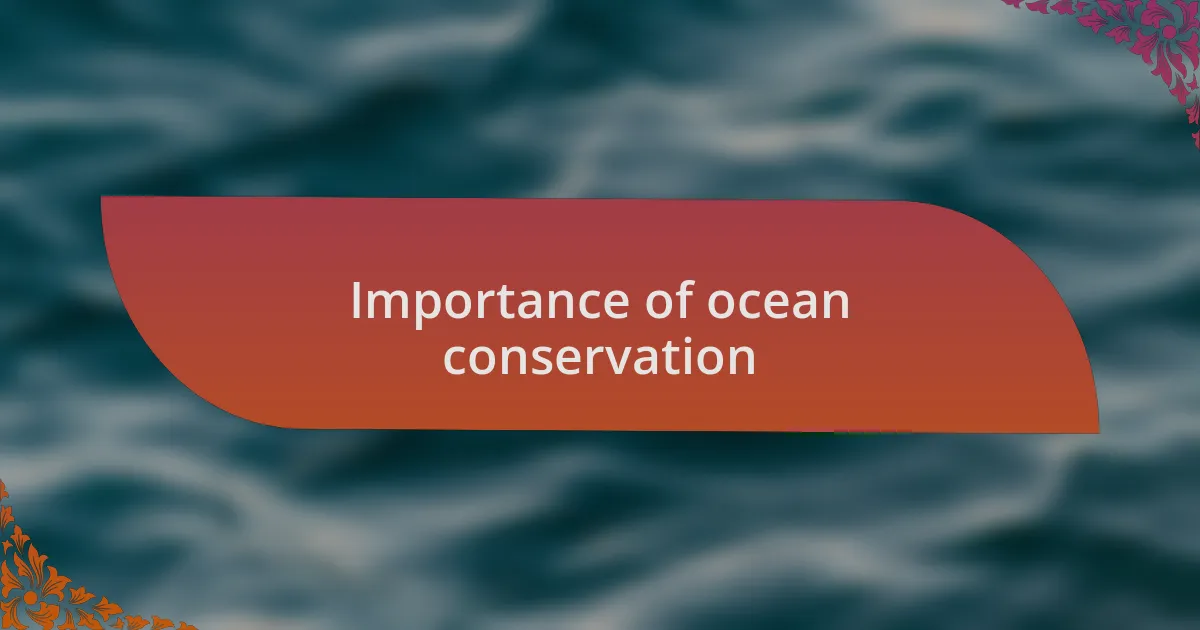
Importance of ocean conservation
Protecting our oceans is crucial for sustaining life on Earth. I often think back to my childhood summers spent by the sea, where I marveled at vibrant coral reefs and playful dolphins. Those memories remind me that our oceans are not just vast bodies of water; they are vital ecosystems that support countless species. When we neglect to conserve these resources, we risk losing irreplaceable habitats and the beautiful marine life they harbor.
The ocean regulates our climate, absorbing carbon dioxide and generating a significant portion of the oxygen we breathe. It always amazes me how interconnected everything is—our health, our weather systems, and our marine habitats. Have you ever stopped to consider how a healthy ocean contributes to stable weather patterns or abundant seafood? I believe that ensuring the health of our oceans isn’t merely an environmental concern; it’s about safeguarding our future and the well-being of generations to come.
I frequently encounter people who underestimate the importance of ocean conservation, often viewing it as a distant or abstract issue. However, every small action counts, and I’ve seen firsthand the difference community efforts make, whether it’s a beach cleanup or advocating for sustainable fishing. The collective power we hold in advocating for our oceans is incredible. Every time we raise awareness about this cause, we’re not just fighting for marine life; we’re fighting for the entire planet.
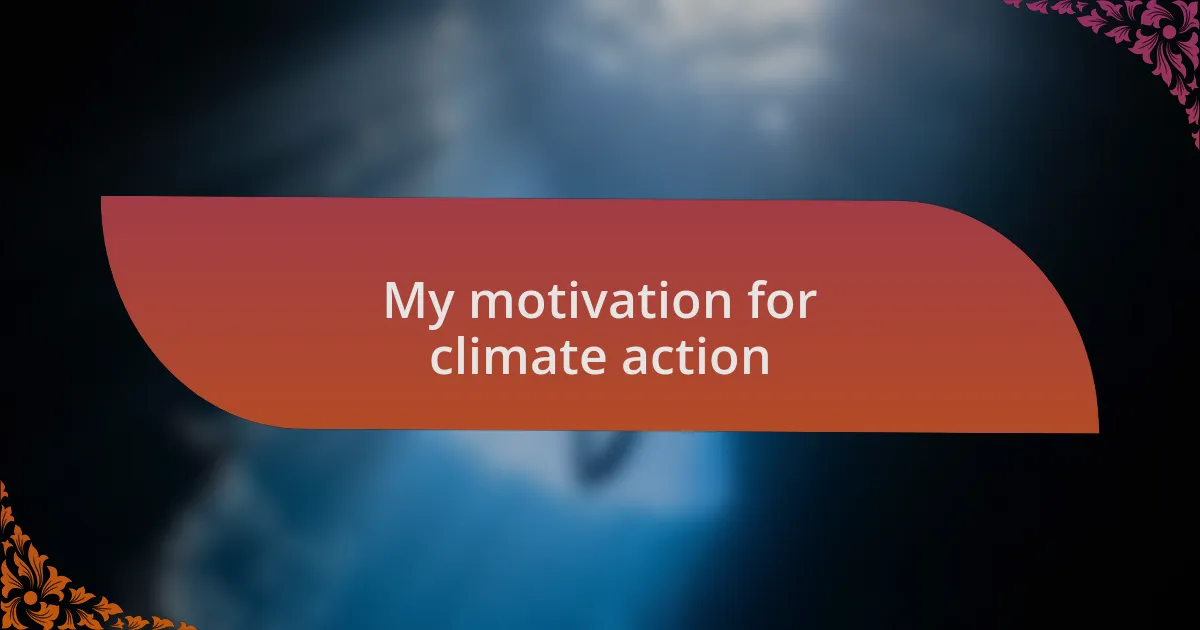
My motivation for climate action
The urgency I feel for climate action stems from witnessing the changes in my own coastal community. I vividly remember diving into vibrant reefs that slowly transformed into lifeless patches. It broke my heart to see fewer fish swimming around, and it made me realize how fragile our oceans truly are. How can we ignore the signs when our playgrounds are disappearing right before our eyes?
Participating in climate strikes has given me a deeper understanding of collective strength. One day, I stood side by side with people who shared my passion, their voices rising in unison for a cause that transcended individual concerns. That moment felt electric—our combined energy underscored our shared responsibility for our oceans. Have you ever felt that rush when standing for something you believe in?
My motivation is also driven by the hope I see in younger generations. I often engage with children excitedly talking about marine life, their eyes shining with curiosity. Their enthusiasm rekindles my own passion and fuels my determination to act. If we don’t fight for their future, who will? It’s not just about climate action; it’s about leaving a legacy of vibrant oceans for them to explore and cherish.
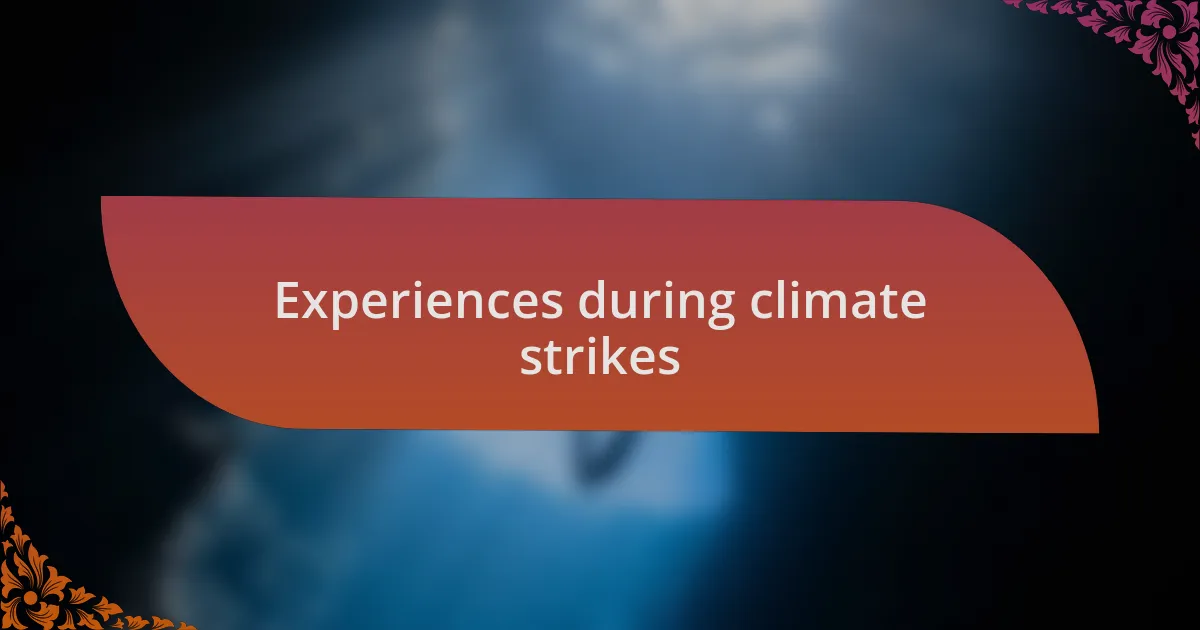
Experiences during climate strikes
Experiencing the energy at climate strikes has been nothing short of transformative. I recall the palpable excitement in the air one particular Friday, where each chant echoed my own frustrations about ocean pollution. It struck me how powerful it felt to join forces with people from diverse backgrounds, all united by the common goal of protecting our planet. Can you remember a time when you felt that strength in numbers, standing for something bigger than yourself?
I also found that each strike opened my eyes to the stories behind the statistics we often hear. One moment that stands out was when a marine biologist spoke about the devastating impact of plastic waste on marine life. I felt a strong pang in my chest, realizing that behind each statistic is a living creature suffering due to our inaction. It made me wonder: what will it take for society to truly connect these dots and prioritize our oceans?
The sense of hope during these events is equally compelling. I remember connecting with a group of youth activists who shared their innovative ideas for tackling climate issues, with plans to create community clean-ups and educational workshops. Their drive reinvigorated my belief that change is possible, reminding me that this movement isn’t just about the grown-ups in suits—it’s about empowering the next generation to lead the charge. What inspires you to get involved, or to perhaps spark change within your own community?
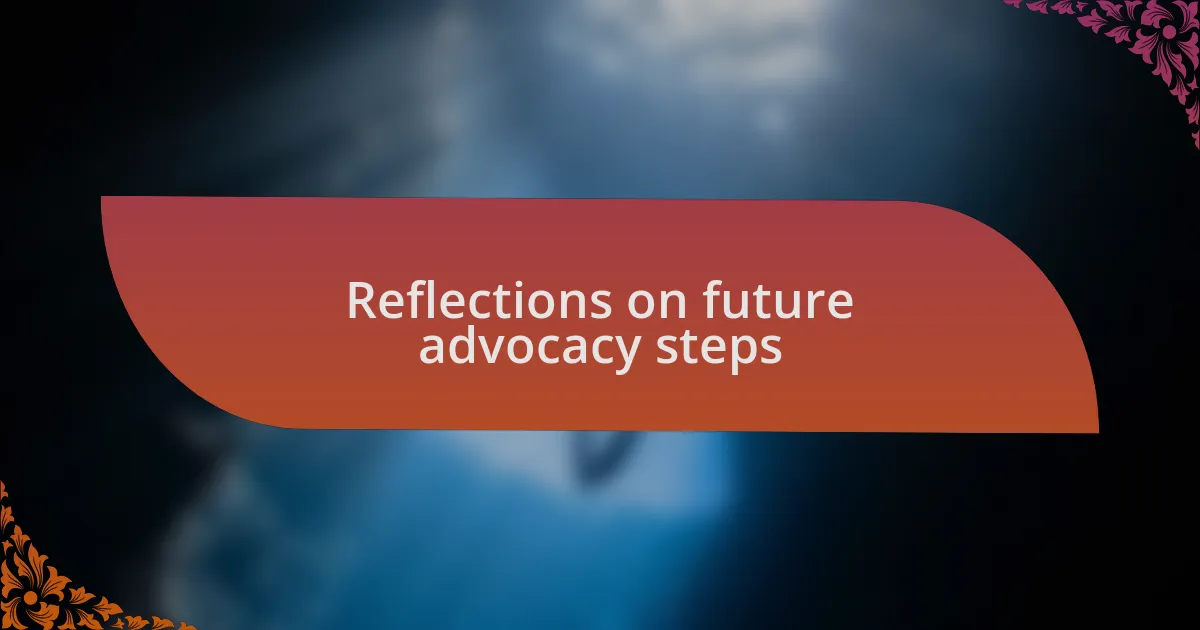
Reflections on future advocacy steps
Reflecting on future advocacy steps, I realize how crucial it is to leverage our collective energy from these strikes into sustained action. During one strike, I met a passionate environmental activist who suggested forming community coalitions focused specifically on ocean conservation. This idea resonated with me, and it made me think: how can we foster long-term engagement and ensure our voices don’t just fade away with the echoing chants?
Moreover, while participating in discussions, I uncovered the importance of merging grassroots efforts with policy advocacy. I vividly remember listening to a speaker who emphasized the need to hold local governments accountable for implementing sustainable practices, particularly relating to ocean protection. How can we effectively bridge that gap between passionate protests and tangible policy changes? It inspired me to consider reaching out to local officials and pushing for programs that prioritize ocean health.
Lastly, I can’t help but think about the impact of education in shaping future advocates. After a climate strike, I joined a workshop led by young leaders who were eager to share their knowledge about marine ecosystems. It was invigorating to explore how we can create similar opportunities for education in our communities. Will we take the initiative to teach others about the ocean’s importance and inspire them to advocate alongside us? Empowering others is a step I consider vital for creating a more resilient movement.